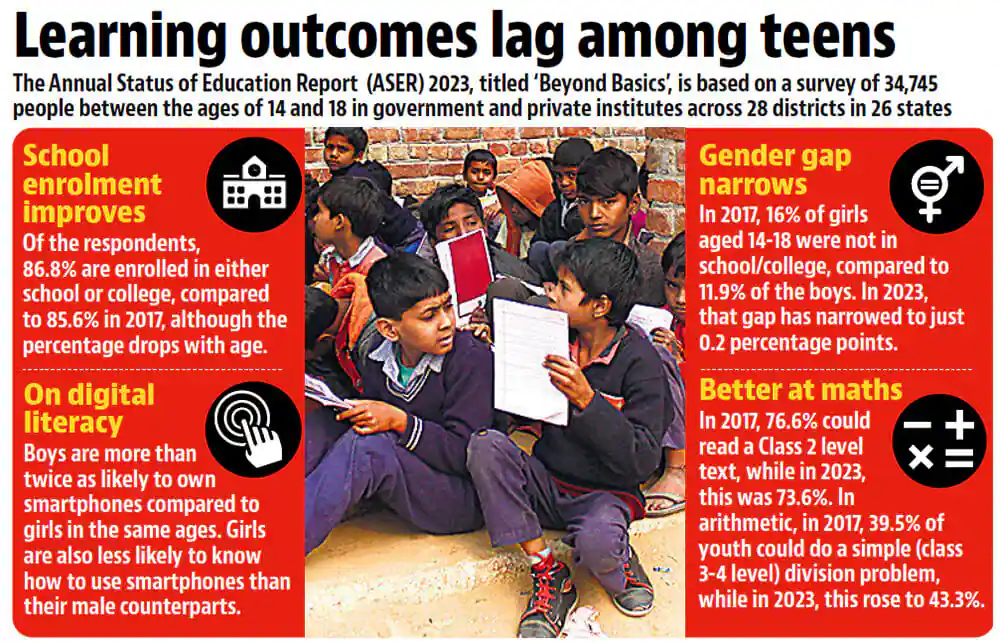From UPSC perspective, the following things are important :
Prelims level: ASER 2023
Mains level: ASER 2023 report underscores the importance of smartphone ownership in shaping deeper access and skills, with a focus on gender disparities
Central Idea:
The Annual Status of Education Report (ASER) 2023 highlights the widespread access to smartphones among 14-18 year olds in India, emphasizing the ownership gap between boys and girls. While most youth can use smartphones for basic tasks, ownership significantly impacts the depth of access to information and services. The study suggests that motivation, often fueled by entertainment during the COVID-19 pandemic, drives learning technology skills. Gender disparities in smartphone ownership contribute to variations in online participation, especially in certain services. Access to devices without constraints promotes self-learning, as evidenced by an earlier Pratham experiment.
Key Highlights:
- Widespread Smartphone Access: ASER 2023 reveals that 92% of surveyed 14-18 year olds in India know how to use a smartphone.
- Ownership Disparities: Nearly half of boys own smartphones, while only 20% of girls possess one.
- Impact on Skills: Ownership influences skills like using social media safety features, indicating deeper access and understanding.
- Motivation and Learning: Motivation, driven by entertainment and the COVID-19 pandemic, plays a crucial role in acquiring smartphone skills.
- Gender Disparities: Girls may show less participation in certain online activities, potentially due to social obstacles rather than technological barriers.
- Educational Use: Regardless of ownership and gender, around 70% of youth report using phones for studies, but the impact on academic learning is unclear.
Key Challenges:
- Gender Disparities in Ownership: The significant gap in smartphone ownership between boys and girls may limit girls’ access to certain online services and skills.
- Social Obstacles: Girls may face social barriers that affect their participation in online activities and use of certain features.
- Impact on Learning: The ASER 2023 report does not conclusively determine the impact of smartphone use on academic learning and performance.
- Inequality in Skills: Ownership disparities contribute to differences in skill levels, particularly in tasks requiring ownership, such as sharing videos.
Key Terms and Phrases:
- Smartphone Skills: Refers to the ability to effectively use and navigate smartphones, encompassing various tasks and applications.
- Gender Disparities: Differences between boys and girls in terms of smartphone ownership, access, and skills.
- Social Obstacles: Challenges related to societal norms and expectations that may hinder certain groups’ access to and use of technology.
Key Quotes:
- “Access to a common smartphone can be described as basic, but owning a smart device is necessary for deeper access to information and services.”
- “Motivation to use and learn new technology came during the COVID-19 pandemic.”
- “Girls seem to show less participation than boys in certain online services, which may have more to do with social obstacles than technological barriers.”
Key Examples and References:
- ASER 2023 Report: Provides comprehensive data on smartphone access, ownership, and skills among 14-18 year olds in India.
- Pratham Experiment (2017): Demonstrates how children, given unfettered access to technology, can learn and adopt digital skills on their own.
Key Facts and Data:
- 92% of surveyed 14-18 year olds in India know how to use a smartphone.
- Nearly half of boys and 20% of girls own smartphones.
- Nearly 70% of youth, both boys and girls, report using phones for studies.
Critical Analysis:
- Ownership Impact: Ownership of smartphones significantly influences the depth of access to information and services.
- Motivation and Learning: Motivation, particularly during the COVID-19 pandemic, plays a pivotal role in driving self-learning of technology skills.
- Gender Disparities: While access is widespread, gender disparities in ownership contribute to variations in online participation.
Way Forward:
- Addressing Gender Disparities: Initiatives to bridge the gender gap in smartphone ownership and access.
- Promoting Digital Literacy: Educational programs emphasizing digital literacy, especially for girls, to overcome social obstacles.
- Integration into Education: Exploring ways to integrate smartphones into education to enhance learning opportunities.
- Understanding Impact: Further research to understand the impact of smartphone use on academic learning and performance.
In summary, the ASER 2023 report underscores the importance of smartphone ownership in shaping deeper access and skills, with a focus on gender disparities. Motivation and overcoming social obstacles are crucial in promoting self-learning, and initiatives to address ownership gaps can contribute to a more inclusive digital landscape
Get an IAS/IPS ranker as your 1: 1 personal mentor for UPSC 2024

